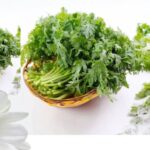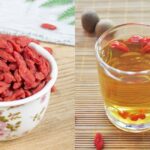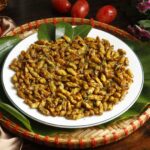Benefits of Regularly Consuming Chives
Potential Cancer Prevention: Chives are a familiar ingredient in Vietnamese cuisine. They are a rich source of flavonoids and natural sulfur compounds, which have been shown to effectively prevent certain types of cancer. These compounds combat free radicals and inhibit their growth, making chives a potential protector against colorectal, breast, prostate, lung, and stomach cancers.
Lowering Blood Pressure and Cholesterol: Similar to garlic, chives contain allicin, which helps lower blood pressure and prevents the production of cholesterol in the body. Additionally, they possess antibacterial and antifungal properties, cleansing the intestines of bacteria and promoting a healthy digestive system.
Preventing Blood Clots: Chives are a source of flavonoids, which help balance blood pressure and are particularly effective in lowering high blood pressure. Rich in vitamin C, chives strengthen capillary elasticity and enhance iron absorption in the body. Regular consumption of chives can prevent blood clotting.
Antibacterial and Antifungal Properties: Chives exhibit antibacterial and antifungal characteristics, making them beneficial for the skin and effective in treating skin infections. Chives can be used as a substitute for ointments to treat scales and open wounds. This property enables chives to eradicate bacteria and fungi, aiding in wound healing.
Promoting Bone Health: Chives are abundant in vitamin K, which is essential for maintaining strong bones. Regular consumption of chives significantly inhibits bone demineralization, especially in women who are more prone to osteoporosis. Including chives in your diet can help increase bone density.
Acne Prevention: Eating chives regularly can enhance your skin’s appearance. The presence of beta-carotene in chives brightens the skin and prevents acne breakouts. Consuming chives can lead to a radiant complexion.
Expectorant Properties: In traditional Eastern medicine, chives are considered both a food and a medicine, with their therapeutic properties being most potent in spring. Chives have a pungent, slightly sour taste, and their nature is warm. They are known to tonify the kidneys, strengthen the yang, warm the middle burner, promote qi and blood circulation, detoxify, stanch bleeding, and dissolve phlegm.
Improving Sleep and Mood: This vegetable contains small amounts of choline, an essential nutrient for maintaining cell membrane structure. Choline also enhances memory, mood, muscle control, and other brain and nervous system functions.
Note: The medicinal properties of chives are most potent in spring. It is incompatible with honey and buffalo meat. Individuals with yin deficiency and excess heat, as well as those with stomach heat, should refrain from long-term consumption of chives.
Chives are highly regarded for their flavor and nutritional value. Both the leaves and stems of chives are commonly used in cooking. They can be stir-fried, scrambled with eggs, made into pastries, or used as a filling for dumplings, among other delicious preparations.
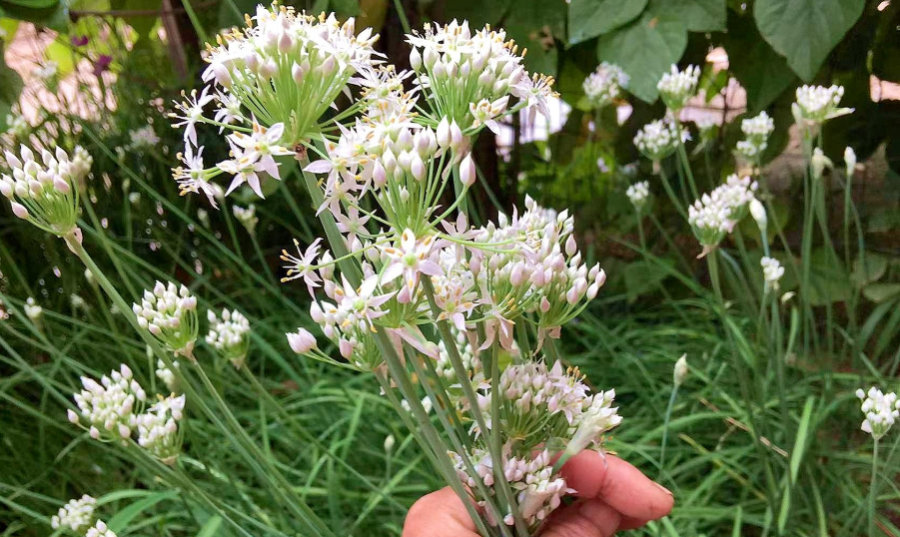
Delicious Recipes with Chives
Chives are readily available in most markets. When cooking with chives, it’s important to note that their essential oil is highly volatile and has a significant lipid-lowering effect. Additionally, chives contain unique components such as volatile oil and sulfur compounds, which emit a pungent aroma, regulate liver qi, increase appetite, and enhance digestive function.
Chive flowers are even more delicious in autumn than the leaves and stems. By pickling the flowers, you can enjoy their unique flavor throughout the winter. Dipping cooked meat or hot pot ingredients in a chive flower sauce is absolutely delightful.
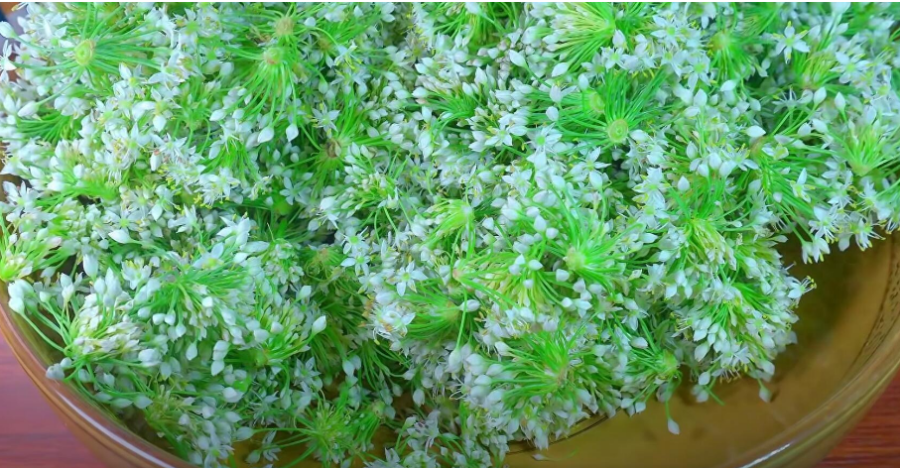
Ingredients: Chive flowers, chive leaves, apples, ginger.
Instructions:
– Spread the chive flowers on a curtain and place them in a sunny or well-ventilated area. Try to remove as much moisture from the flowers as possible, ensuring they are thoroughly dry for longer preservation.
– Prepare a handful of chive leaves and an apple. Place them in a large bowl, add an appropriate amount of water, and rinse thoroughly several times. After washing, dry them with a clean cloth and set them aside to air-dry.
– Take 3 pounds of chive flowers and use kitchen scissors to trim off the upper flower stalks, as they are not tasty.
– Add a spoonful of salt and some water, rinsing 3-4 times until the water runs clear. Drain the flowers and let them air-dry.
– Prepare a piece of ginger, peel it, and slice it thinly. Ginger pairs perfectly with chive flowers. Eating more ginger in the autumn not only warms the stomach and dispels colds but also aids digestion.
– Place the apples on a cutting board and halve them, removing the cores and seeds, then slice them thinly. Finely chop the chive leaves.
– Get out your meat grinder and add the sliced ginger, apple slices, chive leaves, and flowers. Add 2 spoonfuls of salt, cover, and grind coarsely. Avoid grinding it too finely.
– Transfer the ground mixture to a large bowl, stir well with a spoon, and then transfer it to a clean glass jar. Use a spoon to press it down, seal the jar, and store it in the refrigerator. The sauce will taste even better after 24 hours.
– This chive flower sauce can be used for hot pots, mixed with noodles, or used for steamed buns for up to six months without spoiling.
Notes on Preparing Chives
– According to Dan Viet, fresh and beautiful chives are best enjoyed in August. Before preparing chives, be sure to soak them in a mild salt water solution to remove any bacteria and insect eggs that may be present, ensuring their cleanliness.
– When pickling chive flowers, avoid using too much salt. Just enough to give it a salty taste. Excessive salt will mask the fresh and fragrant flavor of the chive flowers.
– If you enjoy eating chive flowers, you can make a larger batch and store them in a glass jar in the refrigerator. They can be used in various dishes such as steamed buns, noodles, or hot pots.
One kilogram of chives contains 5-10g of protein, 5-30g of sugar, 20mg of vitamin A, 89g of vitamin C, 263mg of calcium, 212mg of phosphorus, and a significant amount of fiber. Consuming 86g of chives provides 1.9g of protein, 5.1g of carbohydrates, and 25 calories of energy. Fiber increases insulin sensitivity, lowering blood sugar and fat levels, preventing atherosclerosis, and protecting the pancreas. Odorín is a potent antibiotic that fights staphylococci and other bacteria.
“Supercharge Your Health with This Winter Veggie: A Bunch of This Is Equal to Ten Dandelion Bouquets — Don’t Miss Out!”
This vegetable is a seasonal delight, thriving in the cooler months of autumn and winter. It boasts an impressive array of health benefits, making it a true superstar in the world of nutrition. With its fresh, crisp flavor and abundant nutrients, it’s no wonder this vegetable is a favorite during the colder season.
























